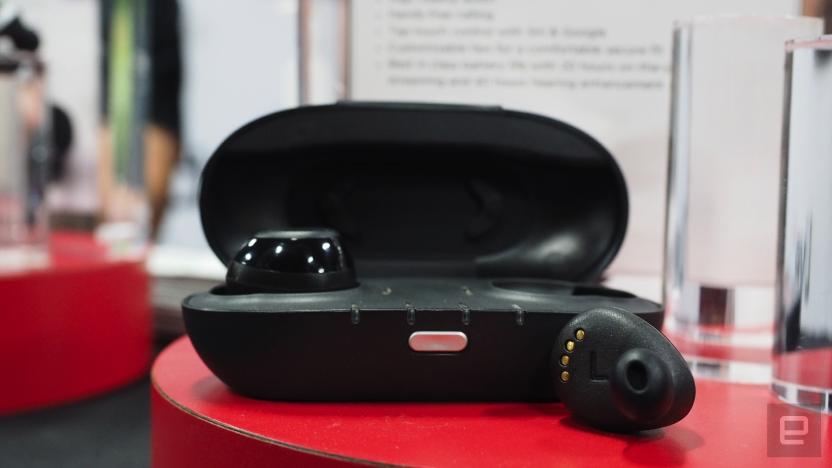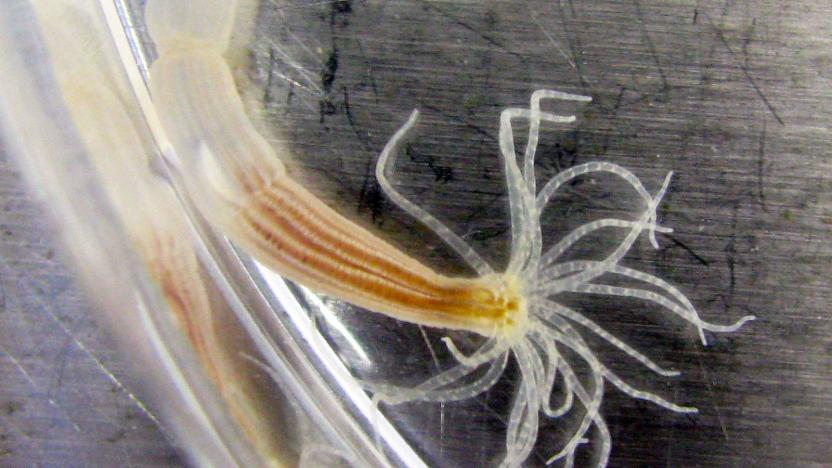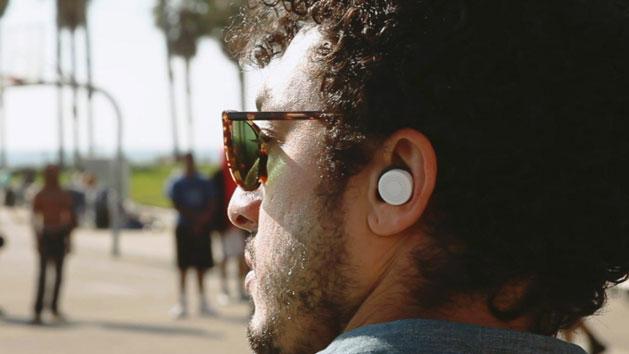hearing
Latest

Zuckerberg will reportedly appear before Congress on data privacy
Yesterday, Congress requested Facebook CEO Mark Zuckerberg appear before the Senate Judiciary Committee to testify about data privacy -- a request that was also extended to Google CEO Sundar Pichai and Twitter CEO Jack Dorsey. Now, CNN says Facebook sources have said Zuckerberg will agree to appear before Congress. Zuckerberg was also asked to appear before the UK's Digital Culture Media and Sport Committee, but he has declined to attend that hearing.

Assistive hearing is the next big thing for wireless earbuds
The number of companies that sell true wireless earbuds has exploded in the last year. B&O, Bose, Sony and Samsung all joined the craze Bragi started back in 2014. Thanks to a bill signed into law last year, some hearing aids and assistive audio devices will be available over-the-counter without the need for a prescription. Headphone companies are also using their tech to help people with hearing problems, especially those suffering from tinnitus.

Senate will consider legislation for self-driving trucks
A bill on autonomous car legislation originally scheduled for a vote on September 6th just passed the US House of representatives and has been sent to the Senate for consideration. The bill does not include legislation regarding autonomous big-rig trucks, however, so the Senate Committee on Commerce, Science, and Transportation is planning a hearing for September 13th to discuss potential implications for self-driving commercial vehicles.

Director of National Intelligence warns of IoT security threats
Hackers aren't the only ones bypassing the weak security of the Internet of Things. According to Director of National Intelligence Daniel Coats, smart devices could also be used to shut down US intelligence operations in the future. At an open hearing today, the Senate Select Committee on Intelligence (SSCI) heard testimony on the worldwide threat assessment of the US intelligence community. Coats' opening statements included a warning of the dangers of poor smart device security as well as the continued inevitability of Russian cyber threats.

Crowdsourced research predicts what molecules smell like
As of now, the only way to tell how something smells is to actually take a sniff. That is to say, there's no observable, scientific measure we know of that can predict how we'll perceive a specific odor. In comparison, things are a little more cut and dried with sights and sounds; because humans use wavelengths to process what they see and hear, we generally agree on, say, how we expect a specific color to look. But scientists now seem to be making progress on the olfactory front: New crowdsourced research has brought scientists closer to predicting a molecule's smell based solely on its chemical properties.

Sea anemones could be the key to treating hearing loss
Sea anemones could soon do a lot to help those of us living above the water. Researchers have discovered that proteins used by starlet sea anemones to repair their cells also repair the sound-sensing cells in mice and other mammals. If you bathe cells in those proteins for long enough (the team tried for an hour), they rapidly restore molecular links that bundle hearing-related hair cells together. In theory, you could reverse hearing damage among cells that haven't been permanently lost -- that exceptionally loud concert might not permanently limit your listening enjoyment.

FCC program that gives tech to deaf, blind Americans is permanent
The FCC's iCanConnect program, which provides communication equipment to low-income deaf and blind Americans, is now permanent after four years in pilot form. Known formally as the National Deaf-Blind Equipment Distribution Program, it offers $10 million a year to local providers of communication technology aimed at helping deaf and blind folks connect with family and friends, and live more independently.

Apple and FBI head back to Congress to debate encryption
Apple and the FBI will once again appear in front of a congressional committee to debate the ongoing encryption issue. The fight over the San Bernardino phone may be over, but the argument over how our data is securely stored rages on.

Nuheara's wireless earbuds can also enhance hearing
At what point does something officially become a trend? For truly wireless earbuds, I'm calling it now. Nuheara is the latest company to enter into the fray, with its IQbuds: a pair that blends ideas from Bragi's music and fitness-focused Dash, and Here's "active listening" experience. The product is currently on Indiegogo, but the category continues to be popular, with IQbuds already raising double its funding goal in 24 hours (Bragi raised millions, Here tripled its goal). I've tried both the Dash, and Here buds, both of which have positives and negatives. IQbuds -- on paper at least -- seems to take the best of both, and roll it all into one, or, er two earbuds.

Apple and FBI to testify at Congressional encryption hearing
As the battle between Apple and the FBI over unlocking a terrorist's iPhone rages on, the US House Judiciary committee will discuss encryption next week. The committee scheduled a hearing for next Tuesday (March 1st) where FBI director James Comey will testify alongside Apple SVP and general counsel Bruce Sewell. This isn't the first time the Judiciary committee has met on the subject of encryption, including briefings from both the government and representatives from tech companies.

ICYMI: The best health innovations of the year
#fivemin-widget-blogsmith-image-766185{display:none;} .cke_show_borders #fivemin-widget-blogsmith-image-766185, #postcontentcontainer #fivemin-widget-blogsmith-image-766185{width:570px;display:block;}try{document.getElementById("fivemin-widget-blogsmith-image-766185").style.display="none";}catch(e){}Today on In Case You Missed It: It's been a pretty magical year for medical innovation, with something for everyone but most especially Star Trek fans. The FDA approved 3D-printed medicine for the first time, prosthetic arms for kids got awesome and researchers helped a man with a severed spine walk, with sensor connections on either side of his spine.

These smart earbuds are volume knobs for the real world
Your choices for filtering the sounds around you are typically quite limited: you either have to drown it out (such as through earplugs or headphones) or let all the annoyances in. Doppler Labs might soon have a way to be more selective, though. Its crowdfunded Here Active Listening earbuds are meant solely to control what you hear in the real world. You not only decide how much gets through, but how it gets through. There's an equalizer if you want to tweak certain sound frequencies (toning down the bass at a badly-mixed concert, for example), and there are preset filters designed to tune out common noises or add effects. Want to silence the background hum of your office without completely shutting out your coworkers? You probably can.

Amped-up ear implant helps to re-grow auditory nerves
Cochlear implants already help those with auditory damage to hear better, but what if they could also grow new nerves while they're there? Scientists at the UNSW have discovered a way to do just that, at least in hamsters. After they introduced a gene therapy solution, a modified cochlear implant used electrical pulses to deliver the treatment directly to auditory nerve cells. That successfully re-generated so-called neurotrophins in the animals, which in turn aided nerve development and significantly improved the implant's effect. Such therapy could one day help the hearing-impaired to pick up sounds better, especially the subtle tones in music. There's a long ways to go prior to human trials, however, since it was only effective in the hamsters for a short time. But it could one day be included as part of cochlear implant therapy and even help other nerve-related conditions, like Parkinson's disease or depression. [Image credit: UNSW Translational Neuroscience Facility]

The Supreme Court heard Aereo's case, whether they understood it could mean everything
We have no doubt the justices of the Supreme Court are well versed and prepared for any copyright law, but do they understand TV or the hows and whys it can be so frustrating sometimes? Like many of us, possibly not that well -- like why HBO can't keep its streaming service up during Game of Thrones? -- which could make reaching a decision in the case between Aereo and the broadcasters seeking to put it out of business especially difficult. During today's oral arguments Justice Antonin Scalia wondered whether the cable- and satellite-only network HBO might be picked up by Aereo's antenna-to-internet setup. The justices were mostly on point, however, needling lawyers for the networks about a previous case for Cablevision's cloud DVR, and how a ruling in their favor could affect cloud internet services.

LSTN headphones: helping people hear in style
LSTN is out to change the way you hear music. But, more importantly, LSTN is helping some people to hear anything, often for the very first time. The brand launched last year with the goal of creating headphones that look great, sound great and -- as we'll see -- help you feel great. The first two goals are relatively straightforward. For example, design-wise, the use of reclaimed wood (cherry, ebony and beech) not only gives them a nice natural look, it also means every pair is unique. It's LSTN's recent work in Uganda and Kenya that should take care of that third goal, however. LSTN works closely with the Starkey Foundation so that every pair of headphones sold helps restore someone's hearing. This weekend sees the conclusion of the most recent excursion, which saw over 5,000 people across the two countries receive help with their hearing through donation of hearing aids. This brings the running total of recipients (previous trips have helped people in Peru, and right here in the US) to 15,000. LSTN's just made making the decision to help someone out (and yourself) even easier, too, with the addition of a zebra wood model to the flagship Troubador range (as seen above).

Honda's HEARBO robot can separate and locate four sound sources at once (video)
Robots are already adept at all manner of things, from hunting to feeling, but over at Honda's Research Institute, one team is focused on an ability bots aren't so hot at yet -- hearing. Puny humans can quickly deduce the direction of a sound and assess its significance, while also ignoring unimportant background noise. Honda is trying to replicate these traits with HEARBO, a robot with eight microphones hidden in its head. Using its HARK software system, HEARBO can distinguish between and locate the position of up to four unique sound sources simultaneously to within one degree of accuracy. It can also filter out din generated by its own 17 motors with a method called "ego-noise suppression." HEARBO's sound localization skills are shown in the first video below, while the second proves it can beat match, dance poorly, and isolate voice commands when music is playing and motors are whirring. The overall goal of Honda's efforts is to generally advance intelligent speech and sound recognition technology. We can't help but wonder, however, if bots will just end up using it to pinpoint our screams when the inevitable occurs.

MIT ear-powered wireless sensor sustains its charge through sound
You wouldn't immediately think of the ear's cochlea as an energy source, but MIT knows that every mammal effectively has a pair of very small power plants because of the ionized environment. School researchers are trying to harness that energy through a new sensor that exploits the whole ear canal system. As eardrum vibrations naturally create a usable voltage from brain signals, the prototype can build enough charge in a capacitor to drive a very low-power wireless transmitter that relays the electrochemical properties of the ear and potentially diagnoses balance or hearing problems. The beauty of the system is its true self-sustainability: once the transmitter has been been jumpstarted with radio waves, it powers itself through the resulting transmissions. Energy use is also sufficiently miserly that the sensor doesn't interrupt hearing. Work is still early enough that there's a long way to go before such implants are part of any treatments, but there's hope that future chip iterations could help fix inner ear maladies, not just report on them. Something tells us, however, that the doctor won't ask us to take two dubstep tracks and call back in the morning.

Apple, Samsung to argue potential bans on infringing phones December 6th in US District Court
Ardent followers of the Apple v. Samsung hearing in California have another date to circle in their calendars: December 6th. AllThingsD and Reuters report Judge Lucy Koh has put that down as the day the two companies can make their cases over two key steps in the process since the verdict (check out our breakdown of the decision and what its $1.05 billion damage award means here) was handed down Friday evening. Apple is requesting an injunction to block the sale of Samsung phones that were found to infringe upon its patents, while Samsung wants to have the jury's verdict set aside. This changes the plans for the previously scheduled September 20th hearing, which will focus on Samsung's effort to get the injunction lifted on its Galaxy Tab 10.1 that was found not to infringe upon Apple's design patent. Whether you'll be tuned in to Twitter for each line by line update or avoiding the internet altogether, at least now you know which day to plan for.

Apple, Samsung respond to the jury's decision; September 20th court date set for injunction hearing
Well. The verdict for the tech industry patent trial of the week is in, and the jury agreed with Apple's version of the events enough to award it a billion dollars and change in damages while awarding Samsung... nothing. Naturally, the two companies differ in their viewpoints on this ruling, with Apple celebrating a decision that supports its originality and innovation, and is "sending a loud and clear message that stealing isn't right." Samsung, on the other hand, claims it's all about standing up for the consumer, who it believes will be the true victim here, forced to pay more for fewer choices and less innovation now that one company has "a monopoly over rectangles with rounded corners." Before we get to the inevitable appeals, Apple is seeking a preliminary injunction against Samsung's infringing products and Judge Lucy Koh has set September 20th as a date for the hearing. Apple has until the 29th to file its motion, which Samsung will have 14 days to respond to, before Apple has two days to craft a response of its own. While we all take a breather before the lawyers get back at it, you'll find the statements from both companies after the break. Update: As expected, Samsung has indicated it will appeal the ruling. Wall Street Journal's Evan Ramstad tweets that it plans to file post-verdict motions to overturn the decision and if those are unsuccessful, it will take its case to the Appeals Court.

Apple does not plan to appear before Australian price inquiry
Apple is in hot water in Australia for refusing to appear in front of a House of Representatives inquiry into retail pricing, says stuff.co.nz. A report by the House of Representatives standing committee on infrastructure and communications claims Apple (and other tech companies like Microsoft) charge significantly more for products in Australia than they do for the same products in the US. The committee wants to know why this pricing disparity exists and has asked Apple for an explanation. The Cupertino company handed over a confidential submission, but the confidentiality clause prevented the committee from using this information in its report. Apple has also refused to appear at the committee's hearings. "Apple has made the utterly wrong call, bringing down the shutters and refusing to engage with this inquiry,'' said Labor MP and committee member Ed Husic. "They're making it difficult for the committee to do its work and it's a massive double standard." This double standard is a reference to Apple's attendance at past US Congressional hearings. Apple's refusal to attend has prompted the members to discuss whether it can legally force the company to attend the hearings. #next_pages_container { width: 5px; hight: 5px; position: absolute; top: -100px; left: -100px; z-index: 2147483647 !important; }












